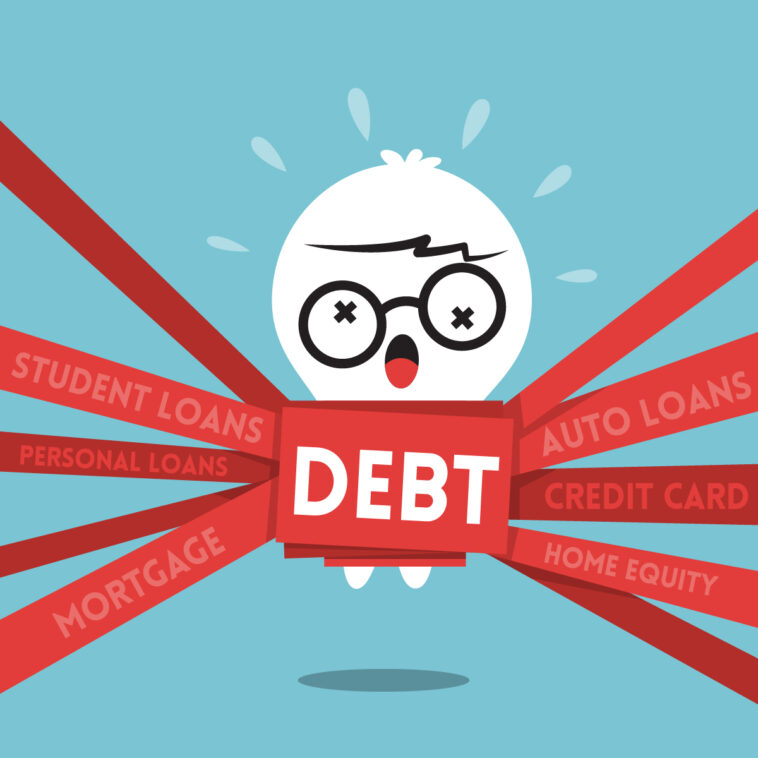Are you juggling a number of money owed and feeling overwhelmed by high-interest charges, scattered funds, and mounting monetary stress? A debt consolidation mortgage could be your ticket to financial freedom. By combining your money owed right into a single, manageable loan with a decrease rate of interest, you may simplify your funds and lower your expenses over time.
On this information, I’ll break down every thing you should learn about debt consolidation loans, how they work, and the best way to resolve in the event that they’re the fitting resolution to your monetary state of affairs. Let’s get began!
What Is a Debt Consolidation Mortgage?
A debt consolidation mortgage is a sort of private mortgage used to mix a number of money owed into one. As an alternative of managing numerous funds with totally different rates of interest, you’re taking out a single mortgage to repay your present money owed. This streamlines your funds, typically with the additional benefit of a decrease total rate of interest or a hard and fast compensation time period.
Debt consolidation loans are sometimes used for:
- Bank card debt
- Medical payments
- Private loans
- Excessive-interest payday loans
How Do Debt Consolidation Loans Work?
The method is straightforward:
- Assess Your Debt: Calculate the full quantity of debt you need to consolidate, together with rates of interest and month-to-month funds.
- Apply for a Mortgage: Discover a lender that gives debt consolidation loans with favorable phrases and apply for the quantity you want.
- Use the Mortgage to Pay Off Money owed: As soon as accredited, use the mortgage funds to repay your present money owed in full.
- Repay the Mortgage: Make a single month-to-month fee towards your consolidation mortgage in accordance with the agreed phrases.
Advantages of Debt Consolidation Loans
Why select a debt consolidation mortgage? Listed below are the highest advantages:
- Decrease Curiosity Charges: Consolidating high-interest money owed into one mortgage with a decrease rate of interest can prevent cash.
- Streamlined Funds: Handle only one month-to-month fee as an alternative of a number of deadlines and quantities.
- Improved Credit score Rating: Paying off bank card balances can cut back your credit score utilization price, doubtlessly boosting your rating.
- Predictable Funds: Mounted-rate loans provide constant month-to-month funds, making it simpler to finances.
Forms of Debt Consolidation Loans
There are a number of varieties of debt consolidation loans to contemplate primarily based in your monetary state of affairs:
- Unsecured Private Loans: These loans don’t require collateral and are primarily based in your creditworthiness. They sometimes have larger rates of interest than secured loans.
- Secured Loans: Backed by collateral (e.g., your house or automotive), these loans typically provide decrease rates of interest however carry the danger of shedding your asset if you happen to default.
- Stability Switch Credit score Playing cards: Switch a number of bank card balances to 1 card with a 0% introductory APR. You’ll want to repay the stability earlier than the promotional interval ends to keep away from excessive curiosity.
- Dwelling Fairness Loans or HELOCs: Use the fairness in your house as collateral for a mortgage. These choices typically include decrease rates of interest however put your house in danger if you happen to can’t repay.
Methods to Qualify for a Debt Consolidation Mortgage
Approval for a debt consolidation mortgage is dependent upon a number of components:
- Credit score Rating: A better credit score rating will increase your possibilities of approval and entry to higher charges. Purpose for a rating of 650 or larger.
- Debt-to-Revenue (DTI) Ratio: Lenders choose a DTI ratio beneath 40%. Reducing your present debt can enhance your eligibility.
- Revenue: Steady revenue reassures lenders of your capacity to make constant funds.
- Mortgage Quantity: Requesting an inexpensive mortgage quantity will increase the probability of approval.
Steps to Get a Debt Consolidation Mortgage
Prepared to use? Right here’s the best way to do it:
- Consider Your Money owed: Record all of the money owed you need to consolidate, their balances, and rates of interest.
- Verify Your Credit score: Evaluation your credit score report for errors and determine areas for enchancment.
- Examine Lenders: Analysis banks, credit score unions, and on-line lenders for the perfect charges and phrases.
- Prequalify: Many lenders provide prequalification instruments to estimate mortgage phrases with out affecting your credit score rating.
- Apply for the Mortgage: Submit your utility together with required paperwork, equivalent to proof of revenue and ID.
- Pay Off Present Money owed: Use the mortgage funds to repay your money owed, and begin making funds in your new mortgage.
Execs and Cons of Debt Consolidation Loans
Earlier than deciding, weigh the benefits and potential drawbacks:
Execs:
- Simplified funds
- Decrease rates of interest
- Potential for sooner debt compensation
- Improved credit score rating with constant funds
Cons:
- Might require good credit score to qualify
- Charges equivalent to origination or stability switch charges
- Danger of falling again into debt if spending habits aren’t addressed
Prime Lenders for Debt Consolidation Loans
Listed below are some respected lenders to contemplate:
- SoFi: Provides aggressive charges, no charges, and versatile phrases.
- Marcus by Goldman Sachs: Recognized for no-fee loans and wonderful customer support.
- Uncover: Gives debt consolidation loans with fastened charges and no origination charges.
- LightStream: Nice for debtors with wonderful credit score, providing low charges and quick approvals.
- Upstart: A very good possibility for debtors with restricted credit score historical past, utilizing AI to judge functions.
Is a Debt Consolidation Mortgage Proper for You?
Debt consolidation loans is usually a lifesaver for managing a number of high-interest money owed, however they’re not your best option for everybody. Take into account the next:
- Are you dedicated to avoiding new debt whereas repaying the mortgage?
- Will the rate of interest on the mortgage prevent cash in comparison with your present money owed?
- Do you will have a credit score rating excessive sufficient to qualify for favorable phrases?
For those who answered “sure” to those questions, a debt consolidation mortgage might be the answer you want.
Conclusion
Debt consolidation loans are a strong instrument to simplify your funds, cut back your curiosity funds, and aid you regain management of your monetary future. By understanding how they work, researching your choices, and committing to accountable compensation, you may take step one towards a debt-free life. Begin exploring lenders right this moment and switch your monetary objectives into actuality!
FAQs About Debt Consolidation Loans
- Will a debt consolidation mortgage harm my credit score? Initially, your credit score rating could dip barely as a result of arduous inquiry, however constant funds can enhance your rating over time.
- Can I consolidate federal scholar loans? Sure, but it surely’s higher to make use of a federal direct consolidation mortgage to retain advantages like income-driven compensation plans.
- What occurs if I miss a fee? Lacking funds may end up in charges, larger rates of interest, and harm to your credit score rating.
- Are debt consolidation loans taxable? No, mortgage proceeds aren’t thought-about taxable revenue.
- Can I embody secured money owed in a debt consolidation mortgage? Most debt consolidation loans concentrate on unsecured money owed, however some lenders enable secured money owed underneath particular phrases.
Take management of your funds right this moment and discover the world of debt consolidation loans. You’ve bought this!


